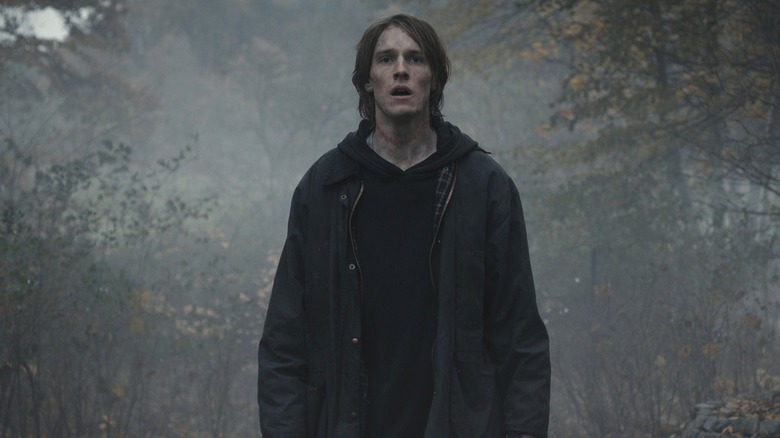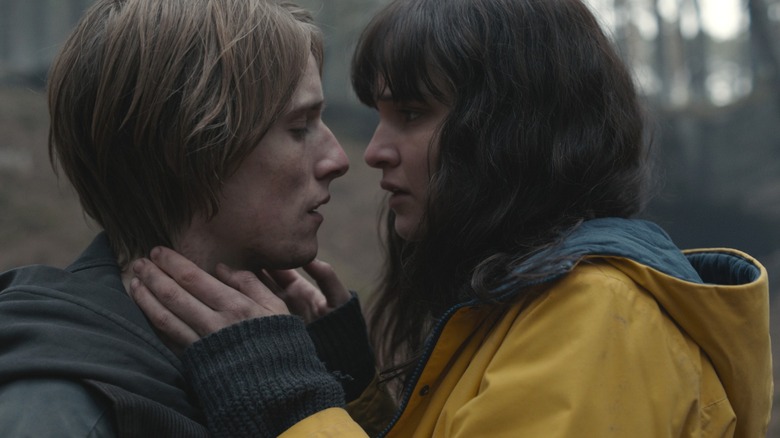Netflix Users Have To Check Out This Mind-Bending Sci-Fi Series With A 95% Rotten Tomatoes Score
Good puzzle box mysteries tend to be audacious and twisty, keeping viewers hooked until their central conceit starts unraveling. Baran bo Odar and Jantje Friese's "Dark" builds a solid foundation for an intricate puzzle box, which dares to jumble up its pieces and even throw in a few extra ones to heighten the confusion. With every season, new questions arise about time, identity, and intent, as every character that inhabits this dark, disorienting world has an important part to play. Just when you think that the show's greatest mysteries will remain unsolved forever, "Dark" reveals its ace, making every puzzle piece click into its intended place. And just like that, every convoluted time loop and twisted motivation makes sense, ushering in a sense of catharsis that is rarely associated with such a thematically dense television series.
Predictability isn't a part of the show's vocabulary. The series opens with a suicide, and we're privy to its aftermath while following Jonas (Louis Hofmann), who has a hard time adjusting to life after spending months in a psychiatric facility. Meanwhile, children start vanishing from the sleepy town of Winden, prompting officer Ulrich Nielsen (Oliver Masucci) to kickstart a more comprehensive investigation. Amid these efforts, Ulrich's youngest, Mikkel (Daan Lennard Liebrenz), goes missing, granting an anguished edge to Ulrich's search for the truth. A body shows up in the forest, but it is not Mikkel — in a troubling turn of events, it looks like a young boy belonging to a different point in time.
Whatever you think happens after is not how "Dark" weaves its mind-boggling mystery. Mikkel's disappearance is just one aspect of a massive web of cause and effect, and the journey to the truth is often dizzyingly exhausting. But what is it about "Dark" that makes us relish this anticipation?
Netflix's Dark is a breathtaking time-hopping spectacle like no other
When Season 1 of "Dark" premiered, favorable comparisons were made to "Stranger Things," which also explores '80s nostalgia and delves into the dark underbelly of government conspiracies. While these similarities exist, they're superficial at best, as "Dark" goes to places that "Stranger Things" can only dream of. It is a complex, mature drama about time and its complex effects on the residents of Winden, who are caught up in relationships doomed by both choice and fate, where the two forces often oppose each other.
Beneath these obtuse motivations, love exists, no matter how twisted. Older versions of characters reach out to their younger selves out of love or a desperate bid to change the past. Sometimes, past selves hinder future selves from ruining it all, but some things can never be altered. The answers provided by the end of the series aren't easy either, as a lot of personal relationships hinge on grey areas instead of binary answers that promptly solve a dilemma. The scientific/metaphysical aspects of the story, however, are sound — not in the realistic sense of the term, but in the way these elements are used to deepen our understanding of Winden as a whole.
The reason "Dark" works from start to finish lies in its self-assured approach to its convoluted mysteries, and the steady faith that audiences will be able to keep up. Things get exasperating at times, but the payoff is significant — at no point are you a passive receptor, as you're expected to actively work out connections, hints, and thematic tie-ins. "Dark" invites you inside its time-bending vortex and holds your hand right before the end to guide you towards an astounding conclusion.
"Dark" is currently streaming on Netflix.

